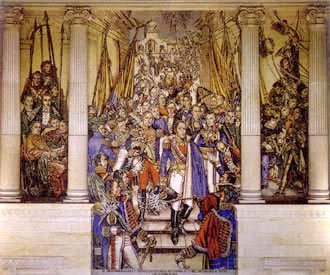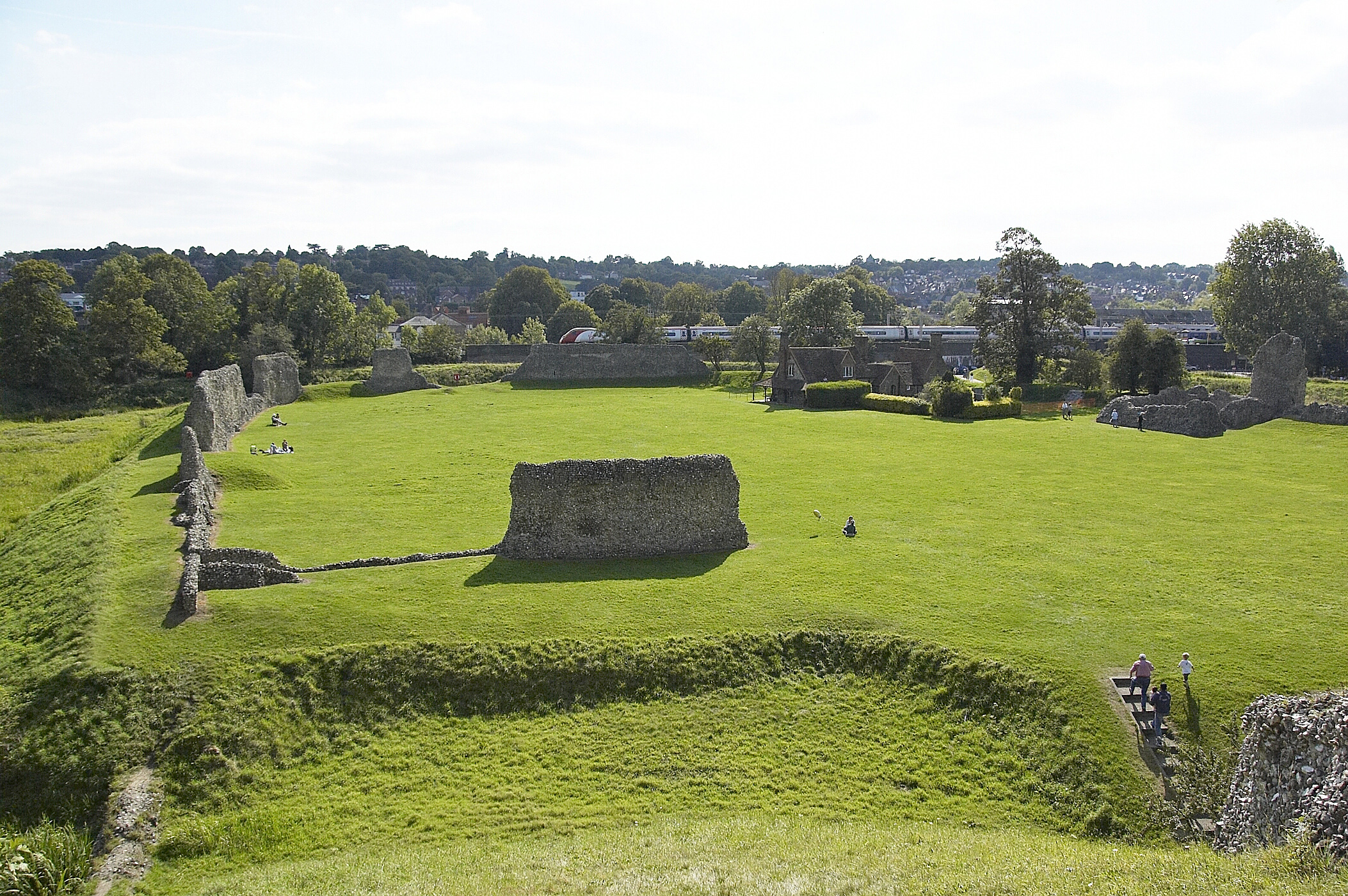|
Congress Of Cúcuta
The Congress of Cúcuta was a constituent assembly where the Republic of Colombia (historiographically called Gran Colombia because it covered the territories of the previous viceroyalty of Nueva Granada and Venezuela, which are several nations today) was created. The Congress elected Simón Bolívar and Francisco de Paula Santander president and vice-president, respectively. The fundamental creation of the Congress was the Constitution of Cúcuta. Creation and achievements of the Congress Cúcuta was the birthplace of Simón Bolívar's dream of uniting South America in one single federal state, and of the principles upon which the political institutions of South America would replace those inherited from the 300 years of Spanish colonial history. Prior to 1819, Simón Bolívar, as well as others who facilitated the revolutionary establishment of the Venezuelan Republic, referred to all of South America as Colombia. Since then, Bolívar had proposed the union of what is toda ... [...More Info...] [...Related Items...] OR: [Wikipedia] [Google] [Baidu] |
Bogotá
Bogotá (, also , , ), officially Bogotá, Distrito Capital, abbreviated Bogotá, D.C., and formerly known as Santa Fe de Bogotá (; ) during the Spanish Imperial period and between 1991 and 2000, is the capital city, capital and largest city of Colombia, and one of the List of largest cities, largest cities in the world. The city is administered as the Capital District, as well as the capital of, though not politically part of, the surrounding department of Cundinamarca Department, Cundinamarca. Bogotá is a territorial entity of the first order, with the same administrative status as the departments of Colombia. It is the main political, economic, administrative, industrial, cultural, aeronautical, technological, scientific, medical and educational center of the country and northern South America. Bogotá was founded as the capital of the New Kingdom of Granada on 6 August 1538 by Spanish conquistador Gonzalo Jiménez de Quesada after a harsh Spanish conquest of the Muisca, e ... [...More Info...] [...Related Items...] OR: [Wikipedia] [Google] [Baidu] |
Santiago Martinez Delgado In The Colombian Congress
Santiago (, ; ), also known as Santiago de Chile (), is the capital and largest city of Chile and one of the largest cities in the Americas. It is located in the country's central valley and is the center of the Santiago Metropolitan Region, which has a population of seven million, representing 40% of Chile's total population. Most of the city is situated between above sea level. Founded in 1541 by the Spanish conquistador Pedro de Valdivia, Santiago has served as the capital city of Chile since colonial times. The city features a downtown core characterized by 19th-century neoclassical architecture and winding side streets with a mix of Art Deco, Gothic Revival, and other styles. Santiago's cityscape is defined by several standalone hills and the fast-flowing Mapocho River, which is lined by parks such as Parque Bicentenario, Parque Forestal, and Parque de la Familia. The Andes Mountains are visible from most parts of the city and contribute to a smog problem, particularly ... [...More Info...] [...Related Items...] OR: [Wikipedia] [Google] [Baidu] |
Democracy
Democracy (from , ''dēmos'' 'people' and ''kratos'' 'rule') is a form of government in which political power is vested in the people or the population of a state. Under a minimalist definition of democracy, rulers are elected through competitive Election, elections while more expansive or maximalist definitions link democracy to guarantees of civil liberties and human rights in addition to competitive elections. In a direct democracy, the people have the direct authority to Deliberation, deliberate and decide legislation. In a representative democracy, the people choose governing officials through elections to do so. The definition of "the people" and the ways authority is shared among them or delegated by them have changed over time and at varying rates in different countries. Features of democracy oftentimes include freedom of assembly, freedom of association, association, personal property, freedom of religion and freedom of speech, speech, citizenship, consent of the governe ... [...More Info...] [...Related Items...] OR: [Wikipedia] [Google] [Baidu] |
Luck
Luck is the phenomenon and belief that defines the experience of improbable events, especially improbably positive or negative ones. The Naturalism (philosophy), naturalistic interpretation is that positive and negative events may happen at any time, both due to random and non-random natural and artificial processes, and that even improbable events can happen by random chance. In this view, the epithet "lucky" or "unlucky" is a descriptive label that refers to an event's positivity, negativity, or improbability. Supernatural interpretations of luck consider it to be an attribute of a person or object, or the result of a favorable or unfavorable view of a deity upon a person. These interpretations often ''prescribe'' how luckiness or unluckiness can be obtained, such as by carrying a lucky charm or offering sacrifices or prayers to a deity. Saying someone is "born lucky" may hold different meanings, depending on the interpretation: it could simply mean that they have been bor ... [...More Info...] [...Related Items...] OR: [Wikipedia] [Google] [Baidu] |
Combat
Combat (French language, French for ''fight'') is a purposeful violent Conflict (process), conflict between multiple combatants with the intent to harm the opposition. Combat may be armed (using weapons) or unarmed (Hand-to-hand combat, not using weapons). Combat is resorted to either as a method of self-defense or to impose one's will upon others. An instance of combat can be a standalone confrontation or part of a wider conflict, and its scale can range from a fight between individuals to a war between organized groups. Combat may also be benign and recreational, as in the cases of combat sports and mock combat. Combat may comply with, or be in violation of, local or international laws regarding conflict. Examples of rules include the Geneva Conventions (covering the treatment of people in war), Middle Ages, medieval chivalry, the Marquess of Queensberry Rules (covering boxing), and the individual rulesets of various combat sports. Hand-to-hand combat Hand-to-hand combat (m ... [...More Info...] [...Related Items...] OR: [Wikipedia] [Google] [Baidu] |
Antonio Nariño
Antonio Amador José de Nariño y Álvarez del Casal (April 9, 1765 – December 13, 1823),Hector, M., and A. Ardila. Hombres y mujeres en las letras de Colombia. 2. Bogota: Magisterio, 2008. 25. Print. was a Colombian ideological wiktionary:precursor, precursor of the independence movement in Viceroyalty of New Granada, New Granada (present day Colombia) as well as one of its early political and military leaders. In 1793 he published the first French to Spanish translation of the Declaration of the Rights of Man and of the Citizen in Spanish America, Spain's American colonies. Born to an artistocratic family in 1765 in Santafe de Bogota, from his youth, Nariño was involved in political activities that he knew how to combine with financial and commercial activities that led him to accumulate a fortune. His foray into politics would see him become mayor of the second vote elected by the council of Santafe in 1789, as well as interim treasurer of tithes of the archbishopric, app ... [...More Info...] [...Related Items...] OR: [Wikipedia] [Google] [Baidu] |
Constitución De Cúcuta I
Constitución is Spanish for "constitution" and may refer to: Geography Argentina *Constitución, Buenos Aires, a neighborhood in central Buenos Aires, where the Estación Constitución railway station is located *Constitución Department, Santa Fe, an administrative subdivision of Santa Fe Province *Constitución railway station, a railway station and subway station in Buenos Aires **Constitución (Line C Buenos Aires Underground) **Constitución (Line E Buenos Aires Underground) *Villa Constitución, a city in Santa Fe Province and head town of the Constitución Department Chile *Constitución, Chile Mexico *Ciudad Constitución Ciudad Constitución is a city in the Mexican state of Baja California Sur. It is the seat of the municipality of Comondú Municipality, Comondú. As of 2020, the city had a total population of 43,805 inhabitants. Ciudad Constitución is a small ..., in Baja California Sur Peru * Ciudad Constitución, Peru Ships * Chilean battleship ''Constitució ... [...More Info...] [...Related Items...] OR: [Wikipedia] [Google] [Baidu] |
Spanish Language
Spanish () or Castilian () is a Romance languages, Romance language of the Indo-European languages, Indo-European language family that evolved from the Vulgar Latin spoken on the Iberian Peninsula of Europe. Today, it is a world language, global language with 483 million native speakers, mainly in the Americas and Spain, and about 558 million speakers total, including second-language speakers. Spanish is the official language of List of countries where Spanish is an official language, 20 countries, as well as one of the Official languages of the United Nations, six official languages of the United Nations. Spanish is the world's list of languages by number of native speakers, second-most spoken native language after Mandarin Chinese; the world's list of languages by total number of speakers, fourth-most spoken language overall after English language, English, Mandarin Chinese, and Hindustani language, Hindustani (Hindi-Urdu); and the world's most widely spoken Romance language ... [...More Info...] [...Related Items...] OR: [Wikipedia] [Google] [Baidu] |
Park Of The Great Colombia
The El Parque de la Gran Colombia (Spanish for Greater Colombia Park or Park of the Greater Colombia) is a historical and tourist complex located in the locality of Villa del Rosario (Cúcuta). It is in the 6th km of International Highway to Venezuela. The park houses: * The House of Santander, where the hero of the independence Francisco de Paula Santander lived his first 13 years; * The historic church of Cúcuta, where the Congress of Cúcuta was established and where the Colombian Constitution of 1821 was written; * The House of the Bagatela, which served as base for the Executive Power in 1821; * The tamarind tree under which the editors of the constitution of the New Granada (then Colombia and Panama) and patriots from Venezuela Venezuela, officially the Bolivarian Republic of Venezuela, is a country on the northern coast of South America, consisting of a continental landmass and many Federal Dependencies of Venezuela, islands and islets in the Caribbean Sea. It co ... [...More Info...] [...Related Items...] OR: [Wikipedia] [Google] [Baidu] |
Historic Preservation
Historic preservation (US), built heritage preservation or built heritage conservation (UK) is an endeavor that seeks to preserve, conserve and protect buildings, objects, landscapes or other artifacts of historical significance. It is a philosophical concept that became popular in the twentieth century, which maintains that cities as products of centuries' development should be obligated to protect their patrimonial legacy. The term refers specifically to the preservation of the built environment, and not to preservation of, for example, primeval forests or wilderness. Areas of professional, paid practice Paid work, performed by trained professionals, in historic preservation can be divided into the practice areas of regulatory compliance, architecture and construction, historic sites/museums, advocacy, and downtown revitalization/rejuvenation; each of these areas has a different set of expected skills, knowledge, and abilities.Jeremy Wells. "Challenging the Assumption about a ... [...More Info...] [...Related Items...] OR: [Wikipedia] [Google] [Baidu] |





